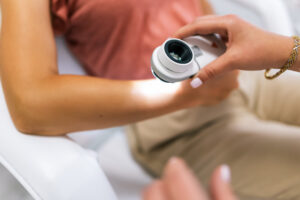Skin Cancer Screening
Board-certified dermatology providers are trained to spot subtle skin lesions that may signal skin cancer. Using devices like dermatoscopes, they can evaluate features of skin lesions that aren’t easily visible to the naked eye. A dermatoscope is a handheld device that allows providers to examine and diagnose skin conditions, including melanoma. If skin cancer is suspected, a biopsy may be necessary, and a dermatopathologist will analyze the lesion under a microscope for a more detailed evaluation.
Skin cancer is the most commonly diagnosed cancer in America, with one in five Americans likely to develop it by age 70. While melanoma accounts for just 1% of skin cancer cases, it is the deadliest form. Many individuals may also be diagnosed with multiple skin cancers simultaneously, and approximately one in ten Floridians has received a skin cancer diagnosis.
Annual dermatological screenings are essential for maintaining skin health, as early detection significantly improves treatment outcomes. While self-examinations are important, they often miss areas like the scalp, neck, and back, highlighting the need for comprehensive checks. Early-stage skin cancer is highly treatable, making early detection not just beneficial but potentially lifesaving.
During your annual skin cancer screening, your dermatology provider will conduct a thorough visual inspection of your skin using a dermatoscope. This device helps assess skin lesions by revealing details such as blood vessels, colors, and patterns that are not visible to the naked eye. Your provider may take photos or notes of any suspicious spots or moles for future reference.
Skin cancer screenings are recommended for everyone over 18, especially for those with risk factors like a family history of skin cancer, fair skin, excessive sun exposure, or tanning bed use.
Regular screenings are vital for detecting and treating potential skin cancers before they escalate. They not only facilitate early intervention but also provide peace of mind by encouraging proactive health management. Most patients should be screened annually, while patients at higher risk should be screened more often in accordance with their dermatology provider’s recommendation.
To schedule your annual skin cancer screening at Bliss Dermatology, please come prepared to undress and avoid makeup, nail polish, and pulled-back hair so that your provider may closely examine your face, nails, and scalp. Bring any concerns from your self-exam, including the location of suspicious lesions, as any growth that causes pain, bleeding, or won’t heal should be addressed.

